The Pylos Shipwreck
In the early hours of June 14, the state-of-the-art cameras of the Coast Guard vessel ΠΠΛΣ-920 were off.
The deadliest shipwreck within the Greek Search and Rescue Zone, one of the largest the Mediterranean has ever seen, was reportedly not visually detected.
Only hours before, aerial photos of the overloaded fishing vessel were taken. Nearby tankers recorded videos before they were ordered to leave the scene. There were satellite images that captured its movement.
But the exact circumstances in which the Adriana capsized off Pylos, killing more than 600 people, remain unclear three weeks on.
In affidavits and interviews, some of the 104 survivors attributed the sinking of the fishing vessel to an attempt by the Hellenic Coast Guard to tow it to Italian waters.
The Coast Guard emphasizes that it saved human lives, and maintains that the fishing vessel overturned due to a disturbance by the passengers.
Solomon, in a joint investigation with the research group Forensis, The Guardian and German public broadcaster ARD reveals: the Coast Guard vessel ΠΠΛΣ-920, the only vessel present at the time the Adriana capsized, was obligated to “document its operation by video-recording” in accordance with a 2021 Frontex document which recommends that the Greek authorities record their operations continually.
If this had been done, today there would be answers to the questions that the victims’ families are still asking.
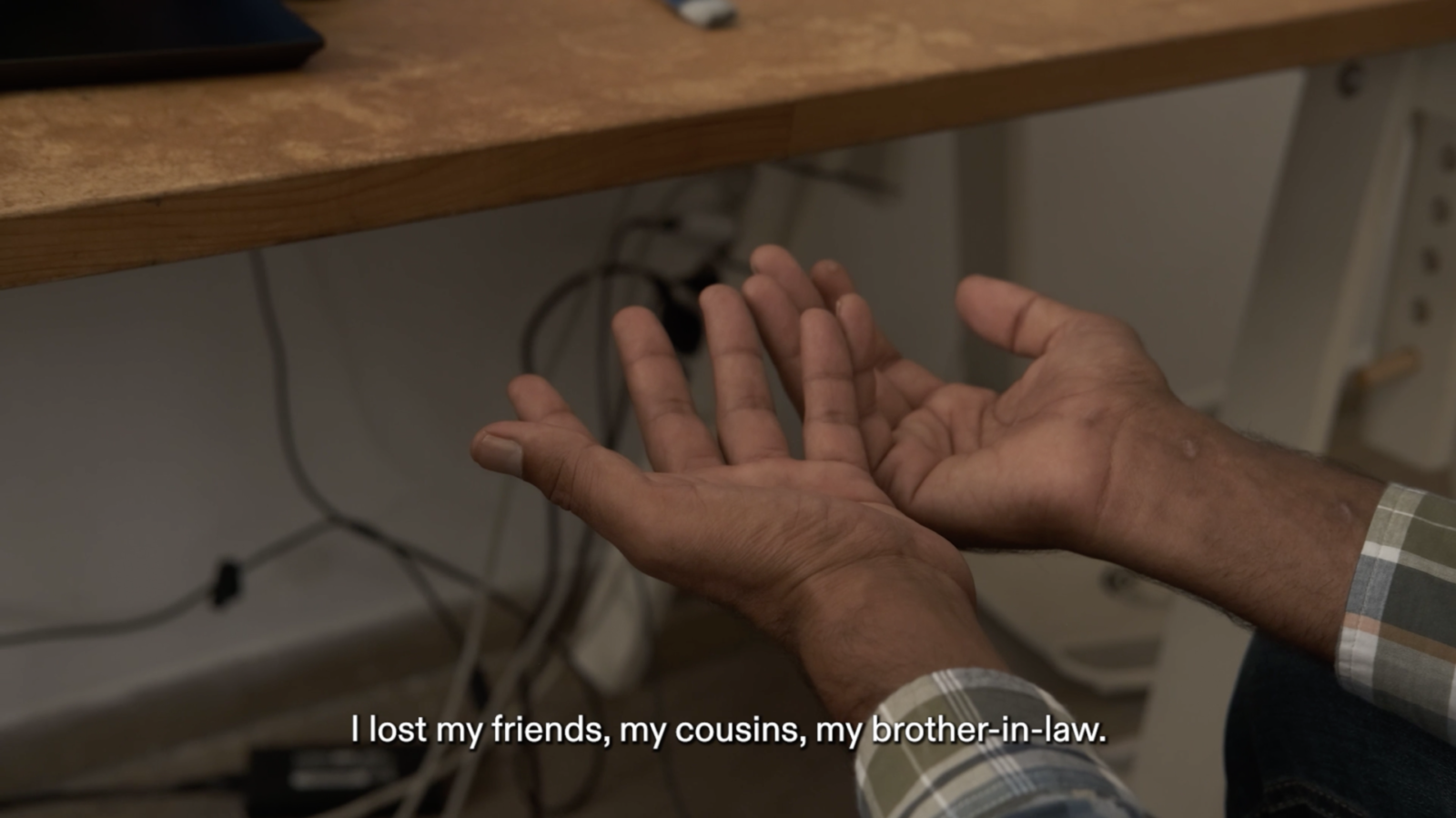
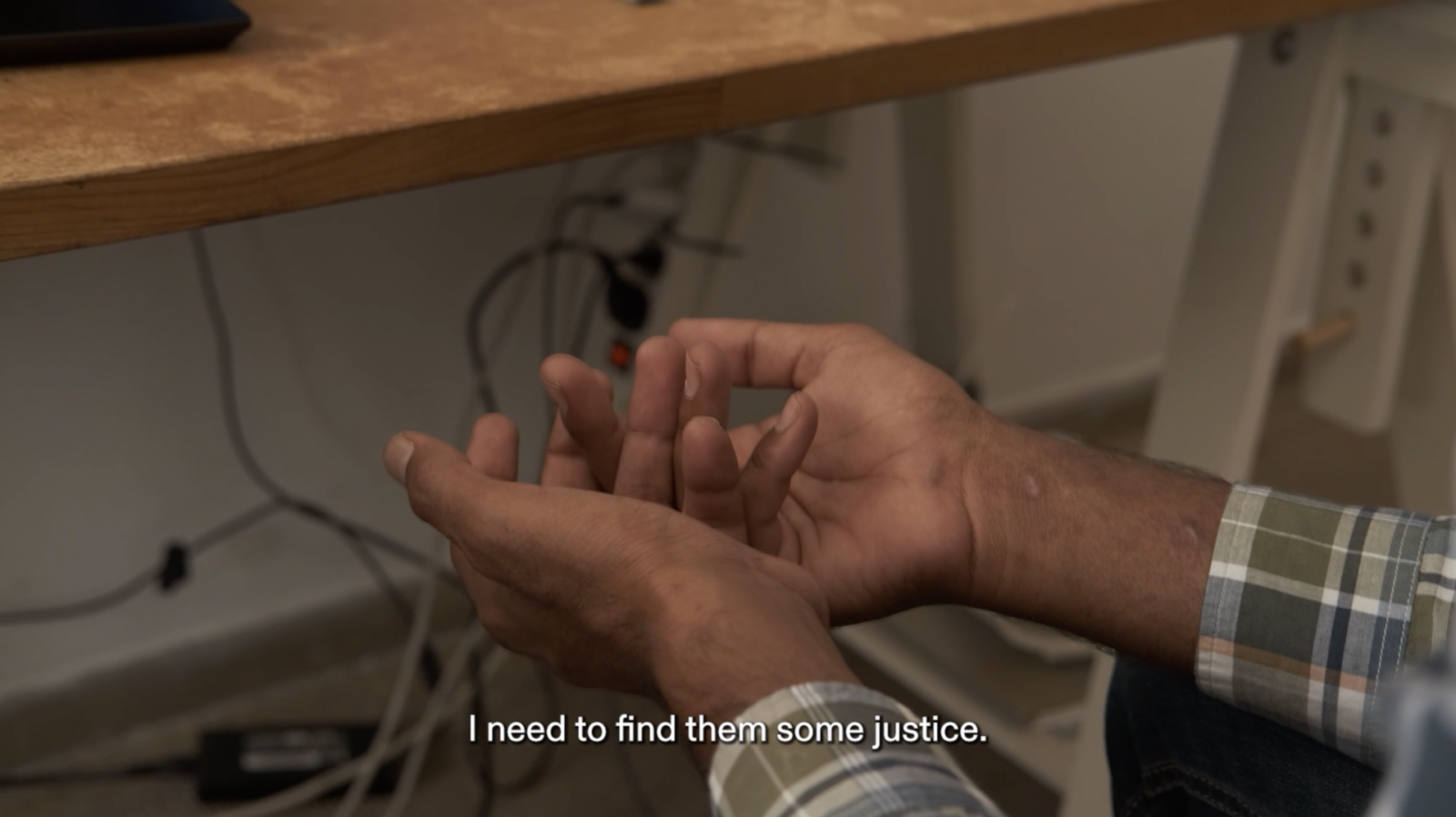
The ΠΠΛΣ-920 cameras were supposed to record
By midday on June 13, the Greek and Italian authorities and Frontex (the European Border and Coast Guard Agency), were aware of the overloaded fishing vessel, which had been sailing aimlessly for four days in the central Mediterranean – its only means of navigation was a compass and the position of the sun.
The activist network Alarm Phone had also relayed to the authorities the desperate SOS of some 750 men, women, and children — mostly from Pakistan, Egypt and Syria — who, lacking potable water, were using their shoelaces to lower containers into the sea: “They are urgently asking for help”.
ΠΠΛΣ-920, the Coast Guard vessel which received the order to depart from the port of Souda, Crete to assist, has been the pride of the Coast Guard since 2021. European funding covered 90% of its cost, and it is one of the best-equipped vessels available in Greece.
And it could not be in better hands: earlier this year, in March, its captain was awarded for “his valuable contribution to the protection of maritime borders and human life at sea.”
According to the Coast Guard, ΠΠΛΣ-920, like its three sister ships (ΠΠΛΣ-900, ΠΠΛΣ-910 and ΠΠΛΣ-930), has two state-of-the-art thermal camera systems. According to the Coast Guard, however, when the fishing vessel capsized, the cameras were not in operation because the crew’s attention was focused on the rescue efforts.
“When we have an incident, we try to have the ability to operate seamlessly. Making some crew members ‘inactive’ so that they can record a video, you understand, is unethical,” Coast Guard spokesman Nikos Alexiou stated on June 15, justifying why the incident was not recorded on video.
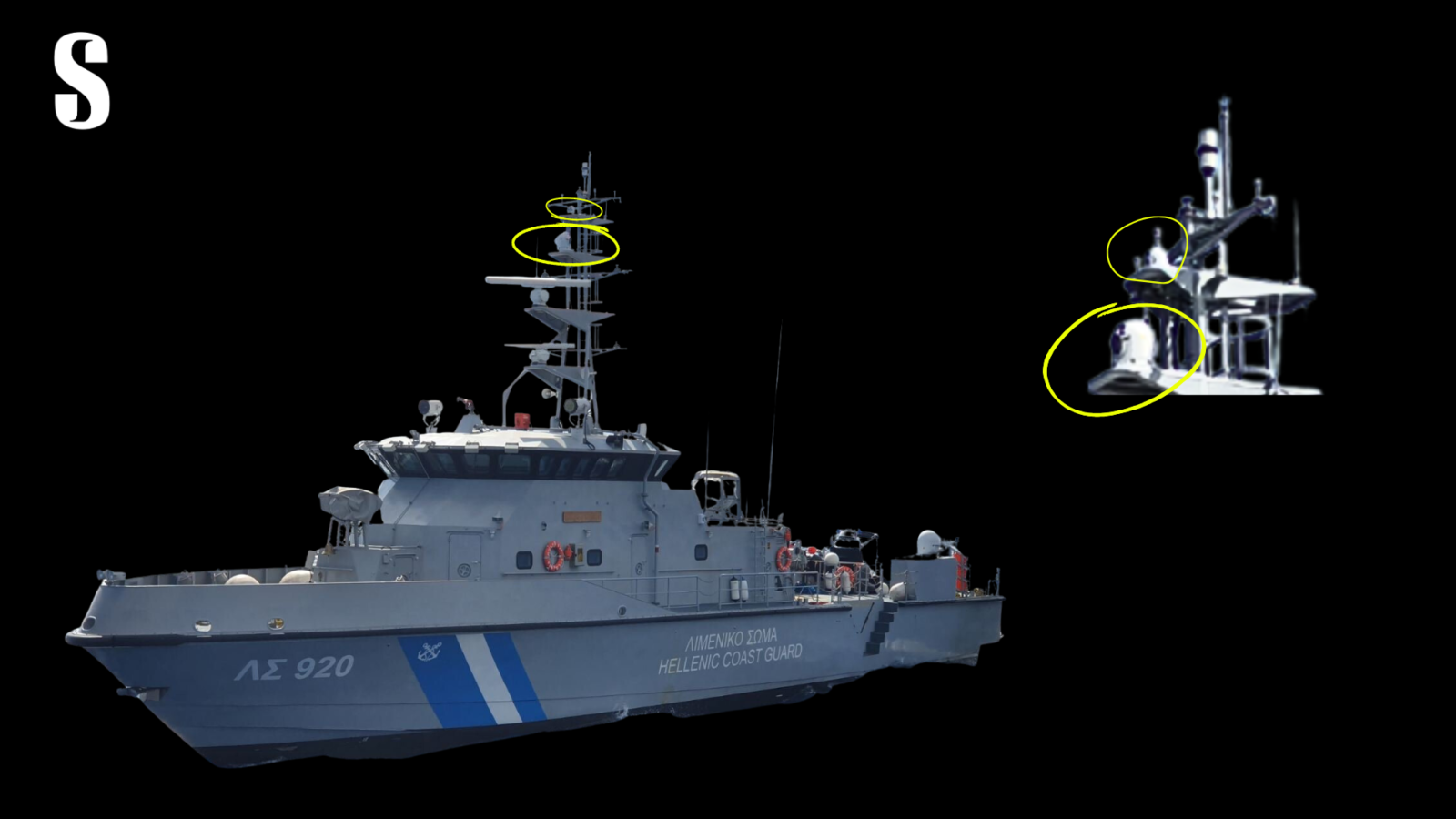
ΠΠΛΣ-920 is equipped with two state-of-the-art thermal cameras.
However, one of the three former and current Coast Guard officers who spoke to us during our investigation, said that these cameras do not require constant manual operation and they exist exactly for this reason – to record such incidents.
But there is still a critical issue: a document reveals that, according to Frontex recommendations in March 2021, the Coast Guard vessel was obligated to record the operation.
The document states that “if feasible, all actions taken by Frontex assets or Frontex co-financed assets… should be documented by video consistently.”
The cost of the ΠΠΛΣ-920, one of four state-of-the-art vessels purchased for €55.5 million, has been 90% financed through Frontex. It is designated to be “available for four months a year, for Frontex missions outside of Greek waters.”
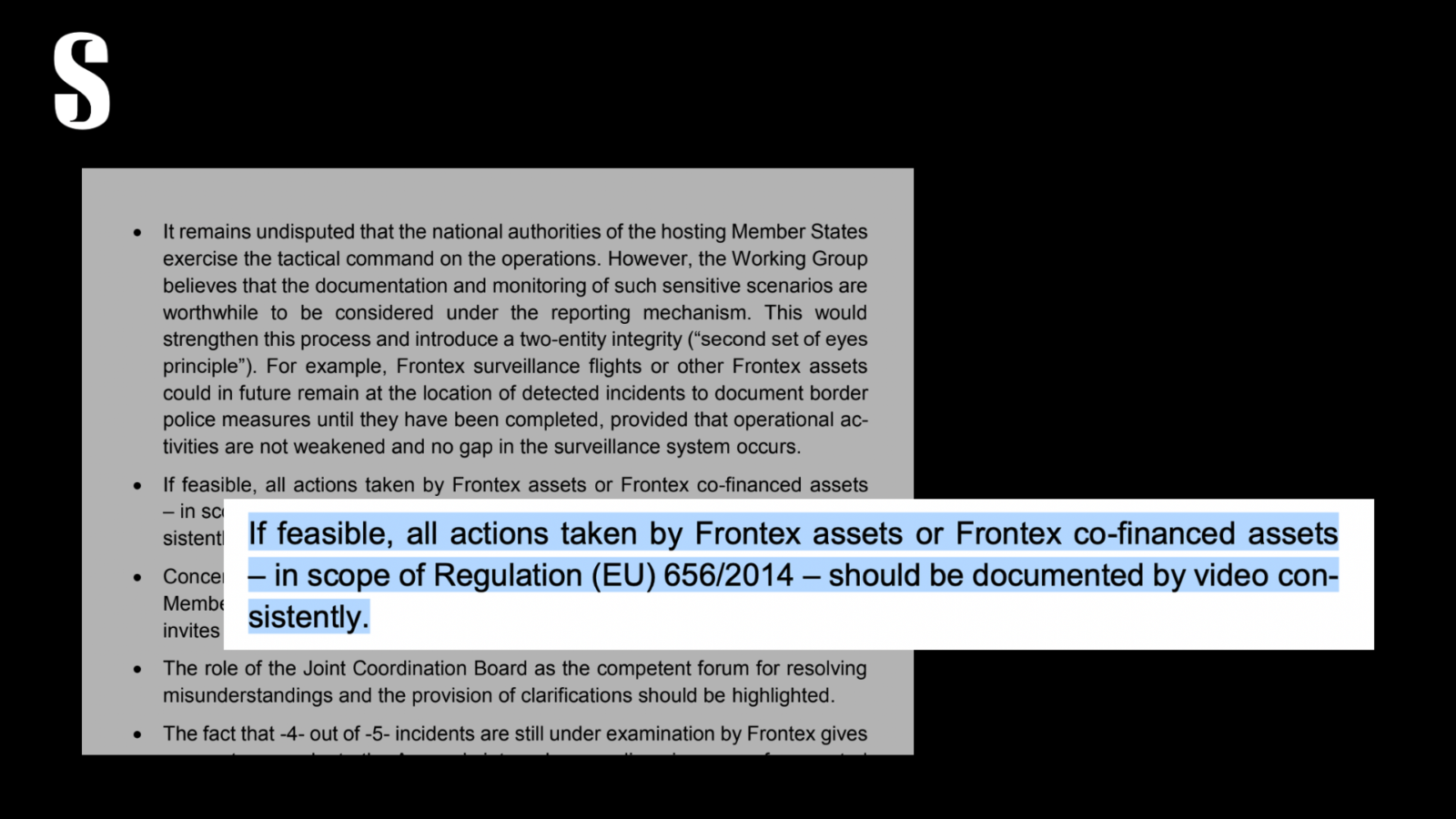
In March 2021, Frontex calls for the Coast Guard vessels funded by the organisation to video record their operations.
Frontex had recommended the visual recording of operations, during a meeting where representatives from Greece were present as well as from other European countries, following complaints of human rights violations by the Coast Guard.
The complaints that were assessed during the meeting referred to the exact same practice, attributed to ΠΠΛΣ-920: towing vessels of asylum seekers outside of Greek waters.
We created a 3D model of the Adriana
Solomon, Forensis, The Guardian and ARD worked together and after analyzing a wealth of evidence, we present the most complete picture to date, of the Adriana’s course up to the time of its sinking.
We collected more than 20 survivor accounts and analyzed material derived from, among others, witness statements, official reports from the Coast Guard and Frontex, deck logs of the Coast Guard vessel and tankers in transit, aerial photographs and data on the position and movement of ships and aircraft. We also secured exclusive footage from the commercial vessels that were in the area and spoke to sources at Frontex, the Coast Guard, and rescuers.
The analysis of this information resulted in a detailed chronology of the events that occurred on June 13 and 14, an interactive map showing Adriana‘s movement, as well as a 3D model of the fishing vessel.
With the help of the 3D model, we were able to do what no official authority or journalistic investigation has done so far: to conduct in-person interviews with survivors of the wreck, using the visual impression of this body of data.
Trawler by Forensis on Sketchfab
Using the method of situated testimony, the survivors placed themselves in the 3D model of the ship, indicated their location on the deck, and recalled the events that unfolded before the sinking of the Adriana: from the alleged towing to its capsize.
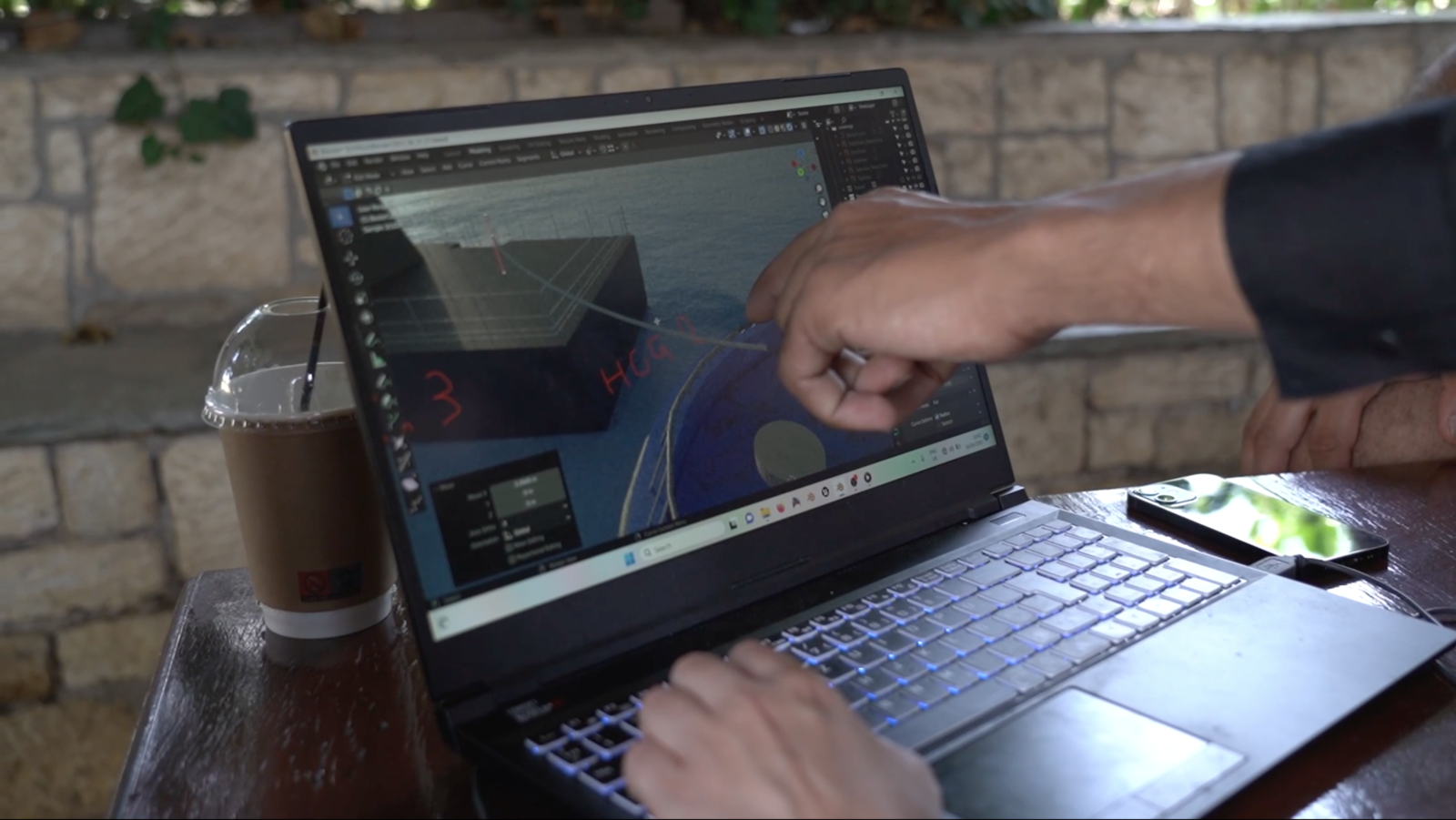
A survivor, using the 3D model, points to the blue rope which was used to tow the Adriana.
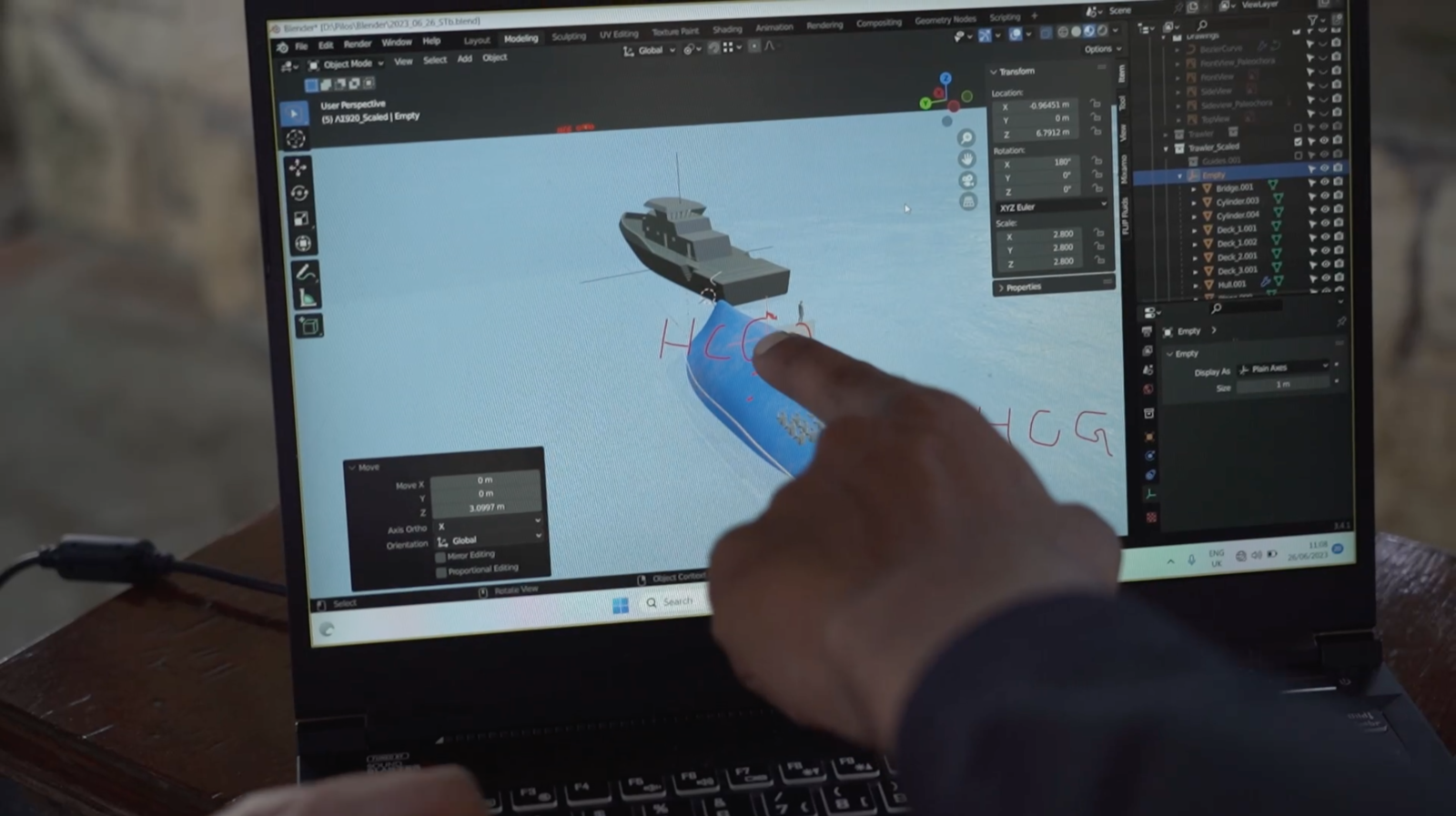
A survivor uses the 3D model to describe how the fishing vessel overturned.
In this way, we were able to cross-reference accounts of what happened in the presence of the Coast Guard vessel, based on each person’s eyewitness account.
Main conclusions
Eleven critical findings emerge from the joint investigation:
- Frontex offered to help three times. A Frontex source stated that the Coast Guard did not respond to any of the three requests for assistance.
- The records of ΠΠΛΣ-920 are incoherent and raise questions. For example, while it is reported that immediately before the sinking, the fishing vessel was moving west, it actually appears to be moving for about an hour (00:44 – 01:40) in a southerly direction at a speed of only 0.6 knots.
- While the fishing vessel’s engine was running but there was no navigation capability, according to testimonies, ΠΠΛΣ-920 approached the vessel and gave directions to Italy. A survivor stated: “[a crew member] told us that the Greek ship would go ahead of us and lead us to Italian waters. He told us that in two hours we would be in Italy.” ΠΠΛΣ-920 directed the fishing vessel from a distance, which followed until its engine broke down again.
- According to Syrian survivors on deck, when the engine broke down, masked men from ΠΠΛΣ-920 boarded the fishing vessel and tied a blue rope to the stern. The above-mentioned testimonies are also consistent with an entry in the ΠΠΛΣ-920 deck logbook, which mentions the participation of a four-member team from the Special Missions Unit in the operation.
- According to the same survivors, there were two brief attempts to tow the fishing vessel. The first time the rope broke. The second time the ΠΠΛΣ-920 increased its speed and the fishing vessel rocked to the right, then to the left, then to the right again and flipped onto its right side.
- The Pakistani survivors were located in the interior of the ship, and could not see what was happening. They stated, however, that while the fishing vessel’s engine was not working, they felt a sharp forward thrust “like a rocket” — a sensation that corroborates the use of a rope for towing.
- Testimonies in this investigation support testaments presented by other journalistic investigations, as well as survivor statements included in the official case file: this action appears to have led to the capsize and eventual sinking of the ship.
- The fishing vessel capsized and survivors climbed on top of it. ΠΠΛΣ-920 left the scene, creating waves that made it more difficult for the survivors to stay afloat.
- After withdrawing, ΠΠΛΣ-920 directed its floodlights on the shipwreck site. Survivors tried to swim to the Coast Guard vessel, but the distance was too great.
- ΠΠΛΣ-920 began the rescue operation 30 minutes after the sinking, and only after the fishing vessel had completely disappeared from the water’s surface.
- Survivors claim that their phones (which were protected in plastic cases) contain visual material from the incident. Immediately after the rescue, according to the same testimonies, Coast Guard officers confiscated their phones, which have not been returned to them.
Survivor accounts of the towing
In the deck log of ΠΠΛΣ-920, which we have seen, there is no mention of any towing attempt. The Coast Guard captain reports that they approached the fishing vessel to offer assistance, received no response, and followed it “from a discreet distance”.
This is disputed by the accounts of the survivors, some of whom not only tell of a rope that was tied to the fishing vessel, but they all mention its color: blue.
This investigation documents, for the first time, the blue cable that was used by ΠΠΛΣ-920, which can also be seen in earlier photos of the vessel.
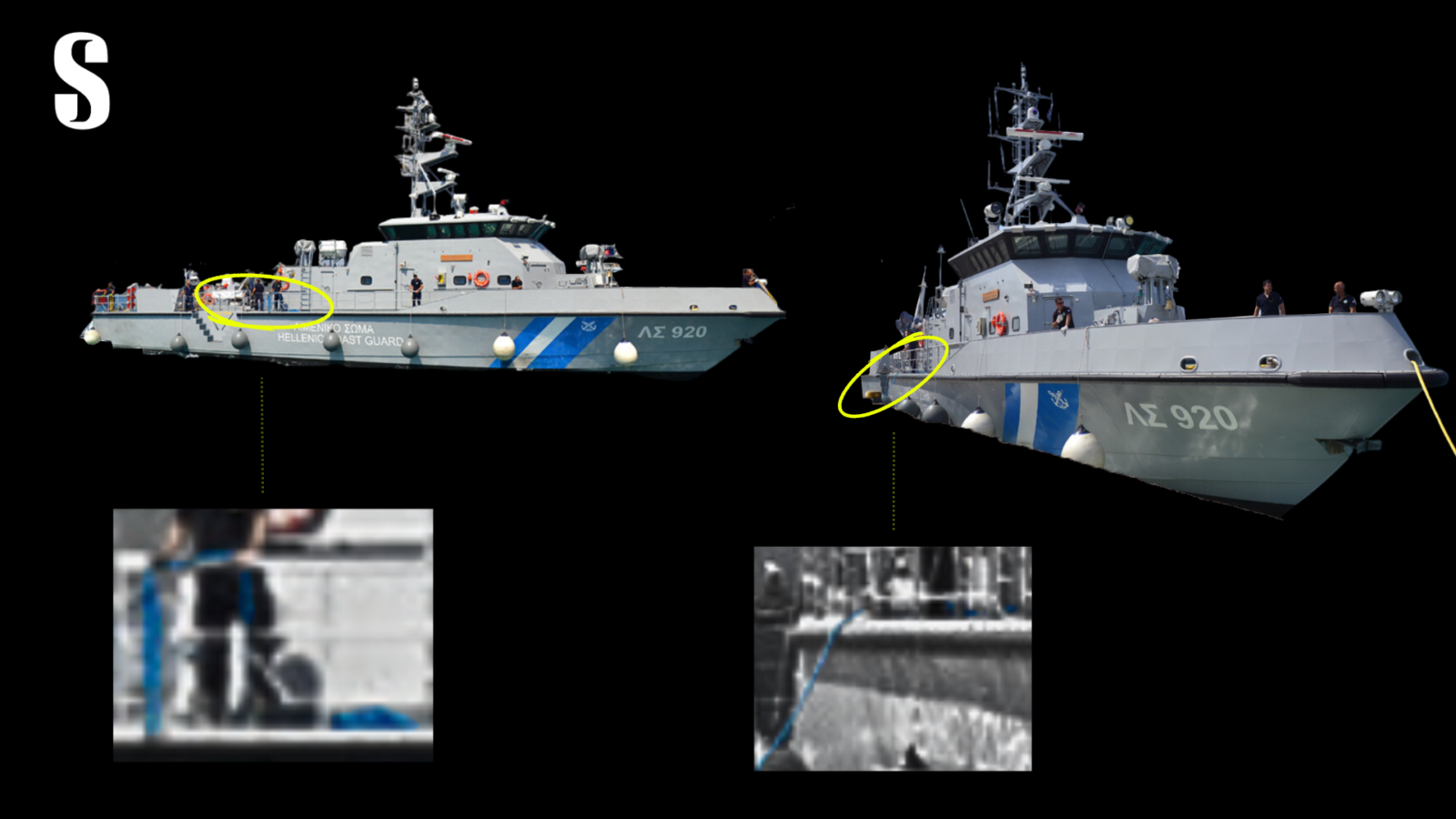
The estimation that the attempt to tow the fishing vessel by the ΠΠΛΣ-920 led to its sinking is underlined by the statements of survivors, that form part of the case file which is available to the journalists that participated in this investigation.
“Then the Greek ship came and threw the rope which was tied to the front of our ship,” says a survivor who was on the deck.
The Coast Guard started towing the fishing vessel, he adds, and “when it was going slowly the fishing vessel was fine, but instead of approaching the Greek ship we were moving away. When they hit the gas, I’m sorry to say, that’s when our ship sank.”
The same survivor estimates that the fishing boat capsized due to the “pulling from the Greek ship, because then our ship began to lean to one side. And I, who was standing in a corner, slipped into the water with a relative of mine, who died.”
Another survivor who was also on the deck, but at the stern and without full visibility, says in his testimony that “it was night, the guys in front told me that they tied the rope, but I could feel the motion too, because then we moved, but not for more than two minutes.”
“Then we said stop-stop because our ship is leaning,” he says, adding, “I think we sank due to the fact that our boat was in bad condition and overloaded and that it shouldn’t have been towed.”
In another testimony, the description of the towing attempt is concise: “On the last day the Greek ship threw us a rope and tied us to their ship. The Greek one turned right, then ours overturned and we fell into the water.”
We contacted the Coast Guard, asking questions about the timeline of the shipwreck and asking them to comment on the findings of our investigation. At the time of publication, we have not received a response.
Why didn’t Greece respond to Frontex?
The picture of what actually happened would be more complete if the ΠΠΛΣ-920 was not the only vessel present during the incident.
According to the captain of the merchant ship Faithful Warrior, at 00:18 the Coast Guard’s Search & Rescue Coordination Center gave him permission to depart the scene, thus removing the last witness present. The Faithful Warriorleft at 00:30, about 15 minutes before the fishing vessel’s engine stopped working, according to Coast Guard records.
Frontex, which operates in the central Mediterranean, had informed the Greek authorities about the fishing vessel early in the afternoon, and had offered to help.
Specifically, at 19:35 (local Greek time) Frontex offered to assist with the Eagle I aircraft. Afterwards, the Greek side asked Frontex to assist in a search and rescue incident south of Crete, where 80 people were in danger. The vessel in question was spotted by the Frontex Heron drone at 22:50.
At 00:34, Frontex again offered to provide assistance with the Eagle I and a few minutes later, at 00:52, it also offered the Heron. According to a Frontex source who spoke to our joint investigation, the Greek authorities did not respond to any request to send aerial assets to the overloaded fishing vessel.
Fabricated testimonies
Concerns have also been raised about the possible alteration of survivors’ testimonies.
Survivors gave two rounds of statements: first to the Coast Guard and then to an investigator. Both versions are available to Solomon and the international colleagues who participated in this investigation.
While there are no references to the attempted towing of the fishing vessel in the survivor testimonies recorded by the Coast Guard, the same survivors spoke about it in the second interview with the investigator.
Also, when describing the shipwreck, the testimonies that appear to have been given to the Coast Guard by two survivors of different nationalities, are the same, word for word: “There were too many people in the boat, which was old and rusty … that’s why it capsized and sank in the end.”
Inside the hold
The TikTok video shows his older brother hugging him tightly and kissing him, before he enters the airport, dragging along his suitcase.
He had flown from Karachi to Dubai, and from Dubai to Alexandria, Egypt. From there he boarded another plane that took him to Benghazi, Libya, where he spent over ten days locked in a trafficker’s hideout, before he was taken to board the Adriana.
When he saw the old fishing boat he couldn’t believe it — he thought the trip to Italy would also be by plane. He wanted to go back to Pakistan, but the traffickers wouldn’t let him.
Inside the Adriana, Abdul traveled on the lowest of three levels, in suffocating conditions where he had to sit with his knees bent. “To get from one place to another, you had to step on people.”
Conditions were similar on the middle level, where about 300 people were reportedly crammed in, with more than 200 people still on deck. The testimonies speak of another, separate space inside the fishing vessel, where women and children were located. No women were among the 104 people that were rescued.
The Pakistani travellers had paid a total of €8,000-€10,000 each for the long journey to Europe – Abdul’s family of rice farmers had sold their land to finance his trip.
Abdul had learned to swim in the canals around his family’s crops – when the Adriana sank, it was his ability to swim that allowed Abdul to reach the Coast Guard vessel and save himself.
As he walks along in Athens, Abdul’s relatives call him, asking what’s the name of the city he’s in. He tells us about his family, but he also shows us photos of loved ones who perished: he was onboard the Adriana with 14 of his friends and his uncle. Only he survived.
And of his 350 fellow Pakistanis who were also in the hold with him, only 12 were rescued. “Beautiful people were lost,” says Abdul.
Women on the Run From Abusers Face Being Returned From Denmark to Syria
In the video, Faten’s ex-husband Wael plays with an unloaded gun. He spins it around his finger. He snaps the magazine in and out of place. All the while, he talks to her, speaking directly into the camera.
“You are lucky because you are in Europe,” he says. “But you will be back for sure.”
“I am in Syria, waiting for you,” he continues.
“Europe will indeed send you back.”
He places the gun against his temple and pulls the trigger: “I am going to shoot you in the head like this.”
Faten and her children live in the suburbs of a Danish city. (We are not using the real names of her or her husband, or naming the city, because of his threats against her.) Her body is still scarred from Wael’s abuse. She says that, in Syria, he would burn her arms with cigarettes, beat her and cut her with a knife. He tried to force her to sell sex to his friends.
Faten left him in 2011, the year the Syrian civil war began. She went to Damascus and married another man, moving with him to Iraq in 2013. “I didn’t love him,” she says of her second husband. “But I wanted to escape and be far away.”
When Faten’s second husband left her, she fled to Europe with her mother and the children she had with Wael. They arrived in Denmark in 2015, along with tens of thousands of other Syrians.
But in 2019, the Danish government announced that Damascus was now considered safe enough for asylum-seekers to return to, stripping hundreds of Syrians of their right to live and work in Denmark. The decision was widely condemned by the U.N. Refugee Agency, the European Commission, and international human rights groups, who documented the risk of torture and forced disappearance under the government of Bashar al-Assad. This year, Danish authorities expanded the list of areas of Syria designated as safe, which now includes the western province of Latakia.
More than 1,000 Syrian refugees have since had their permits reassessed and more than 100 have lost their final appeals since 2019. Denmark does not have diplomatic relations with Syria, so the government cannot actually return asylum-seekers there yet. Instead, those who have lost their right to stay are sent to one of three remote “return centers” in Denmark, where they cannot work or study, for an indefinite period.
When Faten heard about the policy, she was terrified. She knew what it meant for her — that she could be returned to a country where Wael could find her and kill her. He had been surveilling her since she left him. “He was always following my news, asking friends and relatives about me and the girls.”
When Wael heard the news, he saw an opportunity. He found his ex-wife on Facebook and began to send the threatening videos, which have been viewed by New Lines for this story in partnership with the investigative newsroom Lighthouse Reports.
“You are coming back from Denmark,” he says in one, while dressed in military fatigues. (Faten thinks he might be fighting for the Syrian regime, or as part of a militia.) “I will slaughter you.”
In March 2021, Faten received the letter she had been fearing: The Danish Immigration Service was revoking her residence permit. Her future was suddenly clouded in uncertainty.
Faten’s future had been decided by a refugee policy that experts say has been disproportionately punitive toward women. In the case of Syrian refugees, Denmark has “gone so far with their anti-refugee and anti-migrant policies that they’ve ended up undermining their own commitment to gender equality,” says Catherine Woollard, director of the European Council on Refugees and Exiles. Of the more than 150 Syrians who have lost final appeals to keep their Danish residence permits since 2019, over 70 are women, including 49 in 2021 and 15 in 2022, according to figures provided by the Danish Refugee Appeals Board.
A spokesperson for the board that reviews appeals on asylum decisions told New Lines that it is “always aware of the current situation in the country from which the asylum seekers in each case is [sic] from, and therefore attentive to issues such as violence against women.”
This has provided little consolation for Syrian women asylum-seekers, hundreds of whom are on yearlong asylum permits that can be easily rescinded, despite the gendered risks they may face at home or indeed in Denmark.
Migration advocates were surprised when a recent ruling by the board took gender into account in a serious way for the first time. In January, the board decreed that female Afghan asylum-seekers could be granted the strongest form of refugee protection available, solely on the basis of their gender, due to the risk posed by the Taliban, who have all but erased women and girls from public life since they took power in August of 2021.
“I think we were all very happy when, finally, the Danish government did something right to refugees,” says Noura Bittar Soeborg, an advocate for Syrian refugees and women’s rights in Copenhagen, of the Afghan decision. “Unfortunately, when it comes to women from other nationalities, it’s not the same.”
Outside of a situation as extreme as that in Afghanistan, which the U.N. recently described as “gender apartheid,” refugee advocates say asylum procedures are often blind to the specific dangers faced by women asylum-seekers — including domestic violence, sexual abuse and forced marriage. In order to be granted protection, they must battle through a system designed by, and for, men.
Successive Danish governments from across the political spectrum have constructed a tiered asylum system in which women are routinely offered weaker protections. The difficulty of applying the Refugee Convention — the 1951 U.N. treaty that formalized the rights of refugees under international law — to women asylum-seekers is shared across EU countries, but Denmark’s system is uniquely harsh because the country has a specific “opt-out” from the bloc’s immigration policy.
In 2015, as Syrian refugees began to arrive in Europe in large numbers, Denmark’s right-wing then-government created a new “temporary protection” category and made it easier to withdraw permits if conditions in asylum-seekers’ countries of origin improve, even if these gains are fragile.
Figures provided to Lighthouse Reports by the Danish Immigration Service show that 64% of Syrians given this weakest form of protection are women, putting them at significantly greater risk of return.
This is because Syrian men of fighting age risk being conscripted into the military if they return and are therefore more likely to be given the strongest form of protection available in Denmark, known as “convention status” because it is based on the Convention. If Faten were a man, she would not have to go through the same process — she would instead have been granted convention status because of the threat of military conscription.
The Refugee Convention, which expands the 1948 Declaration of Human Rights, sets out five types of persecution under which someone can be considered a refugee: race, religion, nationality, membership of a particular social group or political opinion. These categories often fail to account for the nature of the threats women experience, advocates say.
“It’s not that [women] face less risk than men — I would say sometimes the opposite — but the kind of risk is different,” says Michala Bendixen, the director of Refugees Welcome Denmark. “Conventions don’t really consider this enough, because they were written a long time ago, and they were written by men.”
“It’s a crazy situation where you design a special status, which will be given to the most vulnerable, and which will be the easiest to revoke,” Bendixen says. “So the most vulnerable are on the front line when you have a discussion about returning.”
Since she arrived in Denmark, Faten has repeatedly told authorities of the threat her husband poses to her if she is returned to Syria. “I showed the police here in Denmark everything,” she says of the regular interviews she has had with immigration officials since 2015.
Yet her lawyer, Helle Holm Thomsen, says the immigration officers who reviewed whether to withdraw Faten’s permit in 2021 did not believe her — they questioned whether the man in the video was actually her ex-husband, and implied she’d arranged for the videos to be sent herself, to bolster her case.
The Danish government told us that it takes incidents of domestic violence into account when considering credible threats in an asylum-seeker’s country of origin. But Holm Thomsen says that, in practice, it’s common for women asylum-seekers not to be believed by immigration authorities. “This is how it is in Denmark, the suspicion is that they are just making these things up.”
Faten was able to appeal the decision to withdraw her temporary permit, and was eventually granted an upgraded residency permit in September 2021, one that is based on the individual threat posed by her husband.
Yet even after sharing all that trauma — from the scars on her arms to the videos of her ex-husband holding a gun — her permit was only granted for one year. While it was renewed again in 2022, each time is a reminder that her life in Denmark may be limited. And each time, she risks being called back in for an interview to go over the story for the authorities again. She now has until September next year before her permit expires.
Victoria Canning, who researches the gendered impacts of the Danish immigration system, calls this constant need to reassess asylum status “inhumane,” particularly for survivors of traumatic abuse. “You are creating a kind of egg timer, where a woman is watching time go by, counting down to potentially reentering or experiencing the kinds of traumatic abuse that she has experienced in her past and is still impacted by in the present,” she told us.
If Faten had arrived in Denmark with a husband the same age as her, she would have been covered under his stronger status too. But as a single woman and a survivor of domestic violence, she has been required to prove over and again that it is precisely a man of military age who poses the greatest threat to her in Syria.
Back in Syria, “there is no government or police to go to, it’s all corrupt, even more than before,” she says. “If he wants to hurt me or my daughters, he will do that easily.”
An unintended consequence of the policy is the splitting of families. A brother might keep his permit because the threat of military conscription means he has stronger protection, but a sister loses hers because she was given the weakest form of protection. Syrian families have already been split along gender lines within Denmark, with the men allowed to continue their new lives, while women’s permits are withdrawn.
“Syria is very unsafe for women, especially women alone,” says Soeborg, who has conducted research with dozens of refugee women in Denmark who have experienced domestic violence.
Denmark’s hard-line stance on migration began in 2015 under a right-wing coalition government that included the nationalist Danish People’s Party, but it has been embraced across the political spectrum. After taking office in 2019, Prime Minister Mette Fredericksen’s center-left coalition oversaw the removal of Syrians’ permits as part of a wider policy shift away from integrating refugees to returning as many as possible — a policy whose stated goal is to have “zero spontaneous asylum-seekers.”
Following elections in 2022, Fredericksen’s new bipartisan coalition has doubled down on tough rhetoric, while signaling it may make exceptions for refugees in understaffed professions, following public backlash about Syrian nursing students being ordered back to Damascus.
When Fatima (not her real name) arrived in Denmark in 2016, she was going to be reunited with her husband. He had fled Syria in 2014, after the intelligence services began investigating him. Fatima had cashed in her savings in gold to fund his trip and had been caring for his two daughters from a previous relationship in his absence.
In Syria, Fatima saw the worst of the brutal civil war. She worked as a nurse treating victims of the fighting — she met her husband when she tended to his mother’s gunshot wound. A volunteer from the Danish Refugee Council, who has worked with many asylum-seekers over the years, said Fatima’s traumatic experiences in Syria were the worst stories she had ever been told.
When Fatima and her stepdaughters landed in Denmark, her husband met them at the airport. “My husband approached me and took the two daughters and whispered in my ear: ‘I don’t want you,’” she says. He had been relying on her to bring his children to Denmark; once the girls had been delivered, he tried to abandon Fatima before she could leave the terminal.
Fatima’s brother-in-law eventually managed to convince her husband to allow her to come home with him. “During the first days, he would treat me very badly — he would lock me in the room alone, he would take the girls out to eat and leave me without food at home,” she says. He began to beat her.
In the following days, Fatima was visited by the usual host of officials and volunteers who help new arrivals with processing their claims and settling into Denmark. Today, she has trouble remembering who was who.
“A woman arrived and said she was my contact person and that she would help me,” Fatima says. The woman gave her a booklet about integration in Denmark, but Fatima had bigger concerns. “I told her that my husband does not want me and wants to divorce me.”
Fatima was informed that if she divorced her husband, she would have to go back to Syria. Fighting was raging in her hometown, which we are not naming due to security concerns. “I went crazy,” she says. “I was very afraid to return.”
Because Fatima had come to Denmark through family reunification, her presence in the country depended on her being married to her husband.
Bendixen says this rule can trap women in abusive relationships, forced to decide between the risk of living with an abusive partner and the risk of being returned to a war zone. To get a new residency permit under their own names, women have to prove that they are integrating into Danish society — an impossible task for new arrivals who have not yet had the chance.
“If you arrive, and you get your permit, and then you decide to divorce right after, then you’re in trouble,” Bendixen says.
Rejected by her husband, Fatima had no choice but to take that risk. During a visit from local officials, she found a way to silently reveal the abuse she was suffering. “I stood behind my husband so that he could not see me, and I revealed my chest and legs so the women could see the blue marks on my body and the traces of the beating.”
The caseworkers helped Fatima escape her husband’s house and took her to a domestic violence shelter, where staff helped her begin the process of divorce. But Danish immigration authorities still revoked her residence permit, stating this was because she was “no longer cohabiting at the same residence with [her] former spouse.”
The only way to stay in the country was to apply for asylum from scratch, Fatima was advised. When she went to the asylum center, she was turned away at 5 p.m. on a Friday. Fatima spent the weekend sleeping in a train station, as she didn’t have the money to get back to the shelter.
“I could not talk to the police, I have been afraid of them since I was in Syria. It is impossible for me to talk to the police or ask them for help,” she says.
Fatima eventually received a new permit, which must be renewed every two years. She remains terrified that she will have to return to Syria. She still has panic attacks at the thought of being forced to leave Denmark. “Every time there is a political change or elections in Denmark, I get scared and tense because my situation is unstable and I cannot obtain permanent residency.”
Permanent residency is another often-impossible hurdle for women asylum-seekers to clear. Soeborg, the women’s rights advocate, says she herself has been rejected for permanent residency twice, despite having completed a master’s degree in Denmark and having had a Danish daughter with her ex-husband, because she was unable to meet the continuous employment requirements due to suffering from chronic illness. She says her mother’s application is also at risk after she lost her job during the COVID-19 pandemic.
“I’m exhausted from proving myself,” Soeborg says. “The government is doing systematic violence to us.”
Today, Fatima lives in a home for people suffering from mental illness. She has been diagnosed with depression and obsessive compulsive disorder, her fear of germs exacerbated by the pandemic. She has diabetes and severe rheumatoid arthritis, and needs a walker to move around. She rarely leaves her room. She has little contact with her beloved stepdaughters because she has divorced their father, and they are not biologically related.
“I told my psychiatrist that I do not want to go back, even if I am a dead body,” she says.
Credits:
Contributors:
Fernande van Tets – contributing reporter
Amie Ferris-Rotman – Global News Editor, New Lines Magazine
Media Partners:
This story was a project of the investigative newsroom Lighthouse Reports and was published by New Lines Magazine (English), Daraj (Arabic) and Impact newsletter (French & English).

